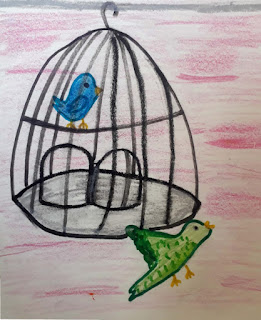The ABC of Dementia Caregiving
In the last 5 years, I have found that it is extremely difficult to explain to anyone unaffected by dementia (or wilfully ignorant of it), what exactly a dementia caregiver (unpaid, voluntary responsibility-taker) does all day, all week, all month...
So I came up with one word for every letter in the A-Z so that someday if you are faced with the choice of taking up responsibility for your LOWD (Loved One With Dementia) you have some idea what you are signing up for:
A is for Advocate
Speaking up for those who cannot speak up for themselves.
Being an advocate for your LOWD's rights, wishes and especially for their rights that are in conflict with their own wishes
B is for Bum area (et al) specialist
The actual daily responsibility one human being can take for another is directly understandable by how much they know about their fluid intake and output, the quality and frequency of their bowel movements, their susceptibility to UTIs and bed sores and most importantly how to get them to cooperate with their own care of these critical systems of the body.
C is for Constant (24*7 on the job)
There is no such thing as shared responsibility or diffused responsibility for a dementia patient. Ultimately, it has to be one person who keeps track of every one of the multiple every changing variables in the patients care. And there is no vacation or down time from that mental load until the day after the funeral.
D is for Diagnostic specialist (what is wrong and how to fix it)
Due to really poor medical care available for geriatric care in general and dementia care specifically, the dementia caregiver themselves has to continuously learn and upgrade their medical knowledge and diagnose what is going wrong and how to fix it.
E is for Entertainment in charge
An idle mind is the Devil's workshop for all of us, but because the LOWD has no capacity to mind their own mind, the caregiver has to fill every waking moment with something engaging or entertaining for them.
F is for Finance manager
Dementia care is an extremely expensive affair because it requires specialised caregiving to care for a rapidly deteriorating and vacillating mind in an ageing body. The healthier the patient's body, the more expensive is the dementia care because dementia slows down the brain's capacity to worry and therefore dementia patients are very unlikely to pass away due to a heart attack or stroke induced by stress, which means they live longer than they would have if they had not had dementia.
G is for God appealer
No one can do much to help other than those who are willing to do it all. God is one sure provider for all things dementia.
H is for Housekeeper
All too often, we hear the common refrain- well, just hire a maid. Well, depending on how dependent the LOWD is, one person just cannot do the actual caregiving plus housekeeping for the LOWD. And housekeeping itself takes on a whole new level of difficulty when you have bedsheets to wash everyday and a variety of desirable yet digestible meals to cook for the LOWD.
I is for Insult attractor
Since the LOWD is unable to give any reliable account of their own experience nor make any critical decisions for their own life and care AFTER they get dementia, everyone from doctors to relatives to 'friendly' visitors and often the LOWD themselves spare no judgement when it comes to assessing the caregiver's decisions as untrustworthy and not in the LOWD's best interests.
J is for Jack of all trades
A dementia caregiver is not allowed to say: I can't do this. Everything is their responsibility and hence they have to learn how to do everything they think they cannot do.
K is for Keeper of sanity (own and others)
Living in the real world reality and the LOWD's dementia reality is a task for the most mentally strong to keep themselves and other household members sanity intact.
L is for Line drawer (boundary setter)
Because the LOWD has no sense of reality anymore, its the caregiver that is often drawing the boundary lines and drawing the ire of those kept out of this scenario.
M is for Mood uplifter
A LOWD's can change suddenly for no perceivable reason and it affects everyone around. So mood uplifting is a constant job.
N is for Nutritionist
I cannot say enough about this grossly undervalued aspect of dementia caregiving.
Giving the LOWD whatever they want to eat is simply disastrous.
O is for occupational therapist
Even though it is in decline, the LOWD's mind does need to be exercised with appropriate occupational therapy.
P is for Public relations officer
Answering phone calls, messages and trouble shooting during conversations which are more like interrogations for the LOWD are a dementia caregiver's least preferred duty.
Q is for Question (same question a gazillion times) answerer
No, they really cannot remember that they have asked you this same question many many times before today itself and do so everyday. You just have to answer as if they are asking for the very first time, even if it is the 1000nd time!
R is Resource (human/time/goods) manager
Dementia caregiving is very much like caring for an infant around the clock except that an infant will grow up in a predictable time frame and can be carried around anywhere.
S is for Servant of servants
No matter how many people you have paid to help, the dementia caregiver is the one who has to serve everyone's needs. Servants are people too and they too have emotional and physical needs that need to be met.
T is for Thinker for two (atleast for self and LOWD + other dependents)
Also like caring for an infant, the dementia caregiver has to think for TWO people all the time. Unlike caring for an infant, this mental load only increases as time passes.
U is for Unexpected everything manager
You cannot plan ahead and have a life about anything because something is going to go wrong at anytime anytime and you are the one at whom the buck stops.
V is for Virtue learner
Patience, long suffering, waiting....
W is for Worrier-Warrior
It is impossible not to worry and it's impossible to survive only worrying. The dementia caregiver has to have the endurance of a warrior.
X is for X-igency planner
If you dont have a back up for your back up, guess who is organising the back up? Yes, you!
Y is for Young (by necessity, irrespective of chronological age in order to care for the LOWD)
I've met so many wonderful human beings caring for their LOWDs when they themselves are old and ill. Dementia caregivers do not have the option of retiring.
Z is for Z class security provider
The seasoned dementia caregiver knows they have to protect their LOWD from everyone all the time and the hardest person to protect them from is themselves.
I really hope this short insight into the ABCs of dementia caregiving will inspire compassion and passionate caregiving for anyone of us who maybe be called to do so.
This is just the ABC.
What you do not know about dementia is the thing that is most important to know.
So for a dementia caregiver, constant learning about dementia is the only way to thrive.




Comments
Post a Comment